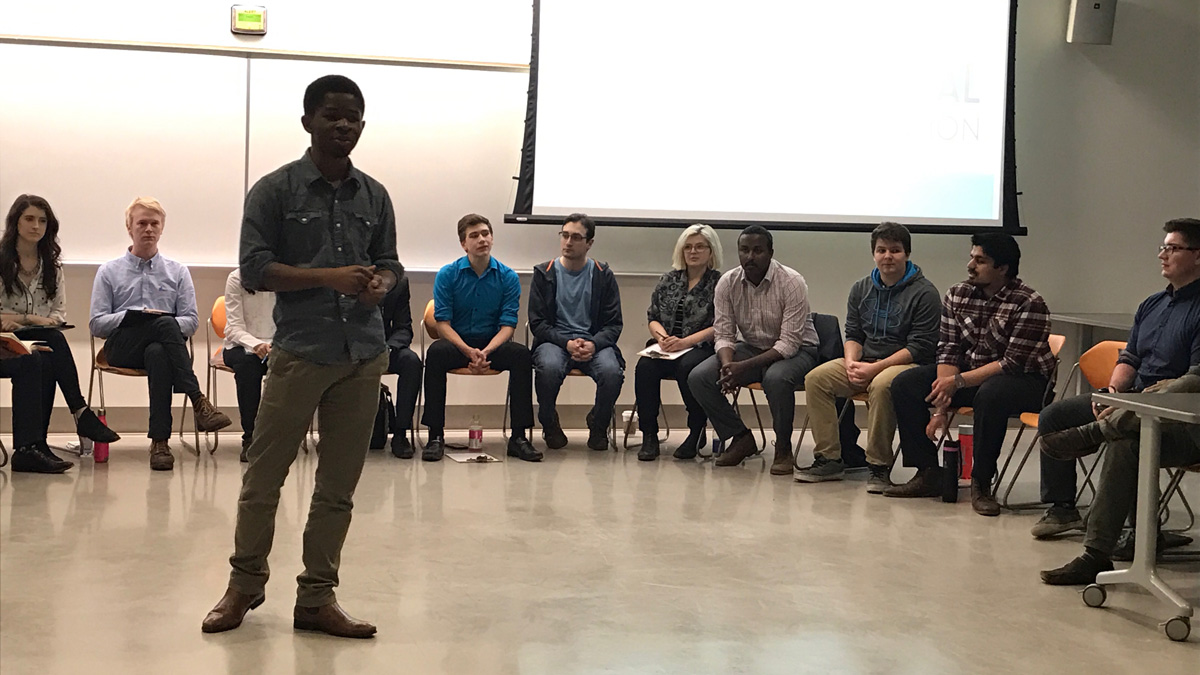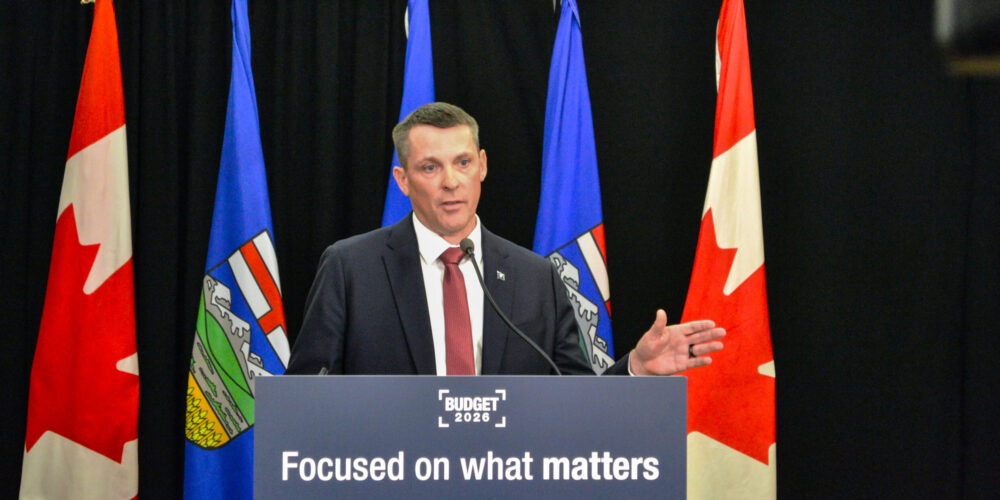Presidential race heats up at international student forum
 Sofia Osborne
Sofia OsborneBoth presidential candidates tried to prove they would advocate best for their international constituents at the first-ever forum hosted by the International Students’ Association.
In his introduction, former student councillor and university ombudsperson Bashir Mohamed told students he plans to regulate the international differential fee, and called it “discriminatory.” He added that he wanted to create a seat for an international student on Students’ Council, and remove the cap on the number of bursaries international students can apply for.
“It’s emotional to be here,” he said. “For the past five years I’ve been working on international student issues as a member of Council and also as a member of the community. When you spend a quarter of your life doing something, it becomes personal.”
Current Vice-President (Academic) Marina Banister also said she wants to regulate the international differential fee. She also said she’d orient international students to other areas of Edmonton besides campus, and promised to work with the International Students’ Association to provide mental health support specific to international students.
“International student issues are woven throughout my entire platform,” she said.
Harder questions, please
Forum moderator Thom Oguntoyinbo asked the candidates what concrete steps they’d take in their advocacy for international students. Banister answered that she wants to make sure international students are protected financially. She said she would advocate “collaboratively” on initiatives like expanding the Jason Lang scholarship to international students.
“Something I think is really important is to work collaboratively not combatively,” she said. “Whether that’s collaboratively with the International Students’ Association, the university, or the government. Lots of people want to be cynical, but we want to always be developing positive relationships even if they’re of different opinions so that we can be moving forward in a productive way.”
In his response, Mohamed questioned Banister’s track record on international student advocacy.
“I should be very clear,” he said. “The Students’ Union has failed international students for the past five years. What’s frustrating is seeing candidates come up here and say the same things but then they do nothing, including (Banister). I’m curious why she’s suddenly so interested in this topic.”
[perfectpullquote align=”right” cite=”” link=”” color=”” class=”” size=””] Something I think is really important is to work collaboratively not combatively. Whether that’s collaboratively with the International Students’ Association, the university, or the government.— Presidential candidate Marina Banister [/perfectpullquote]Mohamed said the Students’ Union has failed because they haven’t evaluated the principle behind the international differential fee — while all students pay the same base tuition, international students pay a differential fee on top of that. Before 1977, he said, the University of Alberta didn’t charge a differential fee and domestic and international students paid the same in tuition.
“The fee has never been about fairness,” he said. “It’s about robbing international students of their money. This fee is discriminatory and we need to take action.”
Mohamed said as someone who came to Canada as a refugee, he “knows what it’s like to be screwed over by the government,” and encouraged students at the forum to ask the candidates tougher questions.
Questioning the power of “building positive relationships”
During open question period, a student noted that a fundamental difference between Mohamed and Banister’s campaigns seems to be in their tactics and strategy. Citing his own lack of faith in the power of “building positive relationships” to deal with issues like rising international tuition, he asked the candidates if they will make any fundamental changes in the way the Students’ Union advocates for international students and their tuition.
Mohamed said Students’ Union executives go into closed meetings with the university and government and there hasn’t been an international student on the executive for five years. He said that in addition to meetings, the Students’ Union needs to run effective campaigns and protests. If the same pressure applied to Lister’s all-you-can-eat meal plan was applied to this year’s 3.02 per cent increase to international tuition, it wouldn’t have passed at the Board of Governors, Mohamed said.
In her response, Banister focused on looking forward.
“I don’t talk about the history because I’m talking about the future,” she said. “I’m talking about what we want to do and what we need to do to make that positive change.”
Banister said she also believes the International Students’ Association should be given official designation and she would continue supporting them in getting recognized. She also promised to consult international students through regular meetings or an open-door policy, and to meet with other cultural groups besides the International Students’ Association, such as the African Students’ Association and Chinese Students’ Association.
“I’m not an international student,” she said. “None of the candidates in the presidential race are international students and we need to rely on the experience of (international students) to guide us in our advocacy work.”
You support us now, but will you support us then?
Another student asked candidates how they would support international students throughout the year, not just around election time. Banister said it’s the Students’ Union’s responsibility to communicate with different demographic associations. She said she wants to see more international students running for executive positions but she understands that might not be an option for them. Her solution would be to advocate to the government to ensure international students have the resources to volunteer or work on top of their studies.
“We want to see more international students up here sitting with us running for these positions themselves,” she said. “But unfortunately that might not be a reality for students because they have such a high cost of education that they’re working part time to support themselves.”
[perfectpullquote align=”left” cite=”” link=”” color=”” class=”” size=””]As the only presidential candidate who’s paid their own tuition and rent, do you know how difficult it is to go to council for two terms, make motions on tuition reduction, have that voted down, and then go home and wonder … how much more you’re going to go in debt? — Presidential candidate Bashir Mohamed [/perfectpullquote]In his response, Mohamed drew on his personal experience of struggling to pay tuition and seeing others do the same.“As the only presidential candidate who’s paid their own tuition and rent, do you know how difficult it is to go to council for two terms, make motions on tuition reduction, have that voted down, and then go home and wonder how you’re going to pay rent or how much more you’re going to go in debt?” Mohamed said. “And then after that go work at the university as an ombudsperson and every day have a student break down because they may get kicked out of university?”
Mohamed then defended his legitimacy as a candidate.
“I completely disagree that I’m combative or unrealistic,” Mohamed said, looking at his opponent. “I have just as much experience, perhaps more, than (Banister) and I want to say, I’m not your angry black guy. I have ideas and you have ideas, so let’s start talking about the issues, okay?”
Past achievements for international students
Later, when asked by Science councillor Umer Farooq what the candidates have accomplished for international students in the past year and a half, Mohamed said he’d speak to the past five years because he had been abroad for the past year in Somalia. In the past five years, he helped create the International Students’ Association, and previously examined the legality of the international differential fee and met with the association about it.
“I’m curious about (Banister’s) answer and why suddenly now she’s so interested in this topic (of international students) and why she thinks she cares more,” he said.
Banister said she’s spent time getting to know people from various cultural associations in the past year while negotiating the international tuition increase. She said she’d continue that by helping the International Students’ Association become recognized as a formal representative association next year.
“I have cared about international student issues throughout my time as a student representative on campus,” she said. “I am the only candidate in my race that is providing not only ambitious goals but solutions on how to get there. I’m not a very hot-headed person, I’m not a very emotional person, and I’m not really a storyteller either. I’m very factual. I think it’s a responsibility as an advocate to take all of your emotions and collective feedback and deliver that to the government and the university in a concise and strong way.”
When asked by Mohamed why she hasn’t achieved any of her goals for international students within her five years as a student representative, Banister said councillors don’t have the power to make those big changes alone. She also said it’s up to the International Students’ Association to decide when they want to take on the status of an official representative association and they have told her they want to look into doing it next year.
“It’s not my place to tell (the International Students’ Association) what and where to operate, how and when to do things,” she said. “Students’ councillors don’t have the power to single-handedly do things like that. I’ve been working collaboratively with my team in Council and with different cultural groups to make those realities happen.”
What will be achieved in one year
Finally, International Students’ Association president Murtoza Manzur, who has endorsed Banister on Facebook, asked the candidates what they want their legacy to be for international students regarding tuition. Banister said she wants to regulate the international differential fee so students know what they will pay for their entire degree.
“I’m only willing to make realistic promises I think I can deliver on,” she said. “I think regulation is something we can realistically talk to the government about and have a strong advocacy plan to achieve.”
Mohamed said he wants to change the whole narrative around international students and not have them seen as a burden.
“I just want a Students’ Union that actually cares about international students, not only during election time,” he said. “Beyond that, I think we should be ambitious, I hate all this pessimism.”




